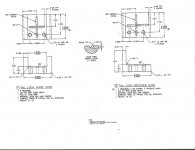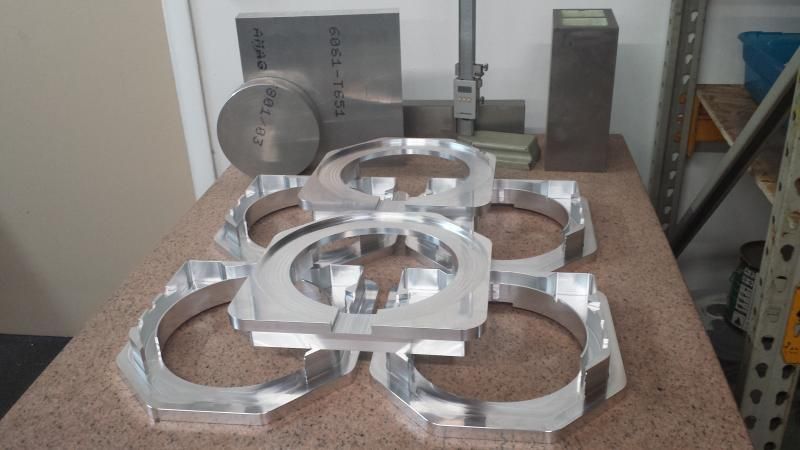Hi,
Long time reader, first time poster here. PM has always been a great resource for me in the past, for both machining issues and shop management thoughts.
Here is a little history of what my shop does:
I run a foundry/machine shop that produces bronze and brass bushings for heavy industrial applications. Manganese bronzes, aluminum bronzes, leaded and tin bronzes, etc. through green sand casting. It is a job shop, running from 1 to 100 parts, up to 600lb finished parts, depending on the alloy. (C863 C865, C903, C905, C907, C911, C932, C937, C954, C955 are the commmon alloys we work with, some are free machining, some are just HATEFUL to work with)
Here is my dilemma:
I feel that the time it takes to machine the parts - on the mills- is 2-5 times long than would be quoted by my competitors, I have even seen some empirical evidence of this on some work orders for castings that I sold to be machined elsewhere.
Our lathe times are respectable, obviously can be improved, but the mill work just is excruciatingly slow.
I talk to my guys, ask them how long they can do a part in, and say for a part 10" long x 5" wide x 2" high, maybe with some grease grooves and some chamfered/Cbored holes, with 0.125" of stock on each surface. A good ball park estimate for their quote is it would take them 8 hours to do one, 4 hours to do many. This is just for a simple block, the times just get outrageous (like 24 hrs for one, 16 hr each for many) when there is any kind of features or undercuts or contouring.
The mills that are being used are a Fadal 15xt, Fadal 5020, and Haas VF-6. we also have some 4th axis rotary heads and right angle/adjustable angle heads.
Also have mastercam X7 mill3 with solids module
I have them walk me though their process, and it just seems like they are too conservative in their approach.
While I totally agree that letting mastercam dictate how to make chips is a great way to ruin parts, I don't think my guys are using it to its full potential as far as achieving a higher spindle up time - removing more metal in one clamping of the workpiece, using more effective roughing/ finishing mechanics, better utilization of cutting edges.
Beyond their hesitance to use CAM software a little more effectively, which I don't think will make up the difference in machining time for my parts, I don't know how to address this issue.
Any thoughts?
Long time reader, first time poster here. PM has always been a great resource for me in the past, for both machining issues and shop management thoughts.
Here is a little history of what my shop does:
I run a foundry/machine shop that produces bronze and brass bushings for heavy industrial applications. Manganese bronzes, aluminum bronzes, leaded and tin bronzes, etc. through green sand casting. It is a job shop, running from 1 to 100 parts, up to 600lb finished parts, depending on the alloy. (C863 C865, C903, C905, C907, C911, C932, C937, C954, C955 are the commmon alloys we work with, some are free machining, some are just HATEFUL to work with)
Here is my dilemma:
I feel that the time it takes to machine the parts - on the mills- is 2-5 times long than would be quoted by my competitors, I have even seen some empirical evidence of this on some work orders for castings that I sold to be machined elsewhere.
Our lathe times are respectable, obviously can be improved, but the mill work just is excruciatingly slow.
I talk to my guys, ask them how long they can do a part in, and say for a part 10" long x 5" wide x 2" high, maybe with some grease grooves and some chamfered/Cbored holes, with 0.125" of stock on each surface. A good ball park estimate for their quote is it would take them 8 hours to do one, 4 hours to do many. This is just for a simple block, the times just get outrageous (like 24 hrs for one, 16 hr each for many) when there is any kind of features or undercuts or contouring.
The mills that are being used are a Fadal 15xt, Fadal 5020, and Haas VF-6. we also have some 4th axis rotary heads and right angle/adjustable angle heads.
Also have mastercam X7 mill3 with solids module
I have them walk me though their process, and it just seems like they are too conservative in their approach.
While I totally agree that letting mastercam dictate how to make chips is a great way to ruin parts, I don't think my guys are using it to its full potential as far as achieving a higher spindle up time - removing more metal in one clamping of the workpiece, using more effective roughing/ finishing mechanics, better utilization of cutting edges.
Beyond their hesitance to use CAM software a little more effectively, which I don't think will make up the difference in machining time for my parts, I don't know how to address this issue.
Any thoughts?






